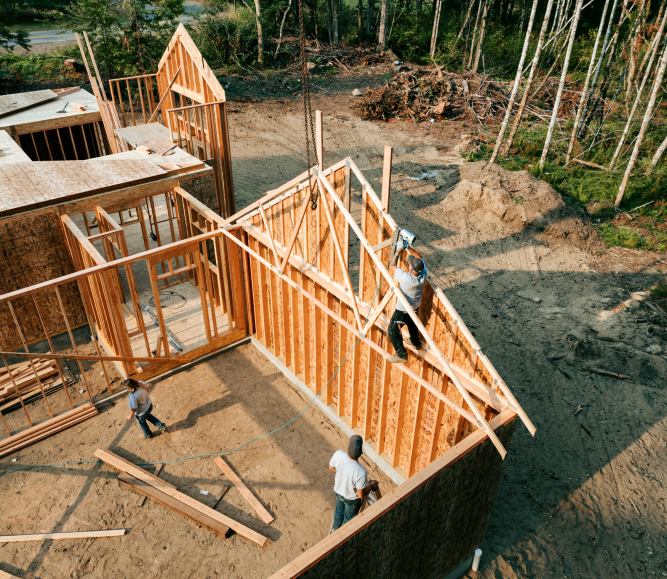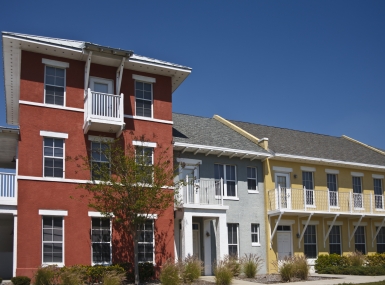Counties for Housing Solutions

Counties are uniquely positioned to facilitate housing growth to achieve important outcomes for all residents, including:
- Stability in a secure living environment that helps people maintain jobs and education
- Financial Flexibility when lower housing costs free up income for essentials like education, childcare and savings
- Opportunity Access so that families can live in areas with better schools, jobs and services
- Health Benefits by improving physical and mental wellbeing
- Workforce Support when located near jobs and thereby boosting employee retention and productivity
- Generational Impact because children in stable homes are more likely to achieve upward economic mobility in their lifetime
In 2024, NACo launched Counties for Housing Solutions (C4HS), which highlights the critical role counties play in expanding housing supply and reducing development costs. C4HS was an intensive technical assistance program that helped counties implement strategies to increase local housing supply. In partnership with Smart Growth America, NACo provided three 14-week sessions that each included weekly virtual workshops and individualized coaching sessions on key strategies to address housing affordability such as zoning and permitting authority and county-owned land development.
New NACo Resource
Get started with NACo’s Guide for Developing Housing on County-Owned Land
NACo’s Guide for Developing Housing on County-Owned Land helps counties develop housing on county-owned land in five easy steps, including site selection, zoning review, pro forma development, developer procurement and community engagement.

Program Overview
About Counties for Housing Solutions (C4HS)
These 23 counties participated in NACo’s C4HS programming:
- Guilford County, N.C.
- Harris County, Texas
- Hidalgo County, Texas
- Jackson County, Mo.
- Salt Lake County, Utah
- Shelby County, Tenn.
- Baltimore City, Md.
- Cheshire, Grafton and Sullivan Counties, N.H.
- Chesterfield County, Va.
- Genesee County, Mich.
- City and County of Honolulu, Hawaii
- Mecklenburg County, N.C.
- Pierce County, Wash.
- Big Horn County, Mont.
- Greenbrier County, W.Va.
- Miami-Dade County, Fla.
- Montgomery County, Md.
- Rice County, Minn.
- St. Tammany Parish, La.
- San Joaquin County, Calif.
- Taos County, N.M.
Highlights of County Outcomes
In 2024 and 2025, NACo supported a total of 23 county teams during three 14-week intensive technical assistance programming.
In July 2025, Baltimore City, Md. reached a tentative agreement with a local developer to consolidate and transfer site control of a vacant block in a high-need neighborhood near the Johns Hopkins Hospital. Developers are in discussions with national philanthropies to secure capital for the development of a 100-unit apartment building, with 50 units set aside as permanently affordable housing.
As of Fall 2025, Chesterfield County, Va. was in negotiations with a developer to build more than 500 units of mixed-income housing on a greenfield county-owned site on unincorporated land. Within 12 months, the county expects to transfer site ownership and break ground to construct a mix of apartments, townhomes and single-family homes.
As of Winter 2025, Harris County, Texas was in the planning stage for a large-scale mixed-use district that will include more than 6,000 housing units, with about 1,200 units designated as affordable. Since the start of 2025, Harris County has also issued three solicitations to develop smaller county-owned sites.
In Winter 2025, Hidalgo County, Texas authorized the creation of a Tax Increment Reinvestment Zone (TIRZ), which uses the targeted area’s future increases in property tax revenue for zone infrastructure improvements. This TIRZ will help finance the development of 525 housing units. These units will maintain affordability for at least 30 years, ensuring long-term community benefit.
As of July 2025, the City and County of Honolulu, Hawaii was finalizing its solicitation for development of 480 rental apartments spread across three towers on surplus land left after completion of the Pearlridge Skyline metro rail station development. This project will provide workforce family housing for median-income households. The county was also working on a partnership with the State of Hawaii to transfer dozens of acres of state land near Waikiki for the future development of over 5,000 apartments.
As of Winter 2025, Jackson County, Mo. was investing in site preparation for surplus land located near Kauffman Stadium. The goal is to convert this underutilized space into new housing opportunities that support local economic development. Jackson County was also planning to develop county-owned sites closer to downtown Kansas City.
As of Summer 2025, Mecklenburg County, N.C. was working with community stakeholders to redevelop a former elementary school to add at least 600 homes on six acres.
As of Summer 2025, Pierce County, Wash. anticipated new construction in the next year of a 60-unit housing site on unincorporated land, with at least 12 permanently affordable units for homeownership. Pierce County was also considering redeveloping three downtown Tacoma parking lots into high-rise housing as part of a broader real estate portfolio restructuring.
In April 2025, Shelby County, Tenn. passed a new ordinance that enables the county to partner with the City of Memphis to revitalize public land for housing. This collaboration is expected to streamline development and expand housing access.
Other Counties for Economic Mobility Programs and Resources
Counties for Housing Solutions (C4HS) is part of Counties for Economic Mobility (C4EM), a NACo initiative for county leaders to advance equitable upward economic mobility to move individuals and families out of poverty. C4EM supports a range of activities to drive data-driven and community-informed policymaking in county government.

Rural Leaders for Economic Mobility
Rural Leaders for Economic Mobility is a knowledge-sharing peer learning network that will empower local government leaders and partners from 10 low-population counties.

County Levers to Drive Economic Mobility: Local Solutions and Strategies
This report focuses on the underlying elements of economic mobility and identifies how county leaders can use local power and authority to leverage county policy, planning and service delivery as levers to foster upward mobility for residents.

Economic Mobility Resource Hub
Explore these resources to promote inclusive economic prosperity for county residents.
Stay Up To Date
Related Analysis, Reports & Toolkits

Housing Affordability for America's Counties
Discover how counties play a crucial role in addressing the housing crisis through community planning, zoning, financial policies, and federal partnerships in our "Housing America's Residents" series of briefs.

Advancing Local Housing Affordability: NACo Housing Task Force Final Report
The final report from NACo's Housing Task Force offers an extensive look into the issues, presenting actionable strategies and federal policy recommendations.
Program Contact
